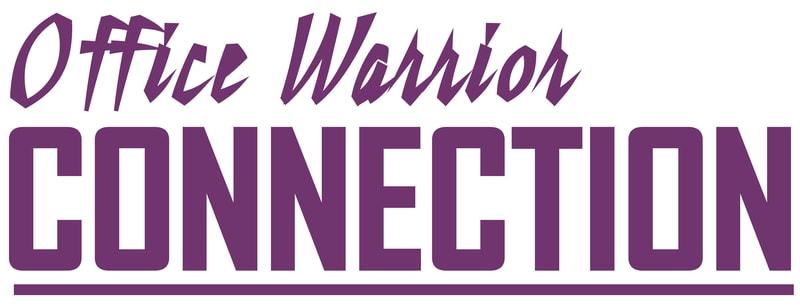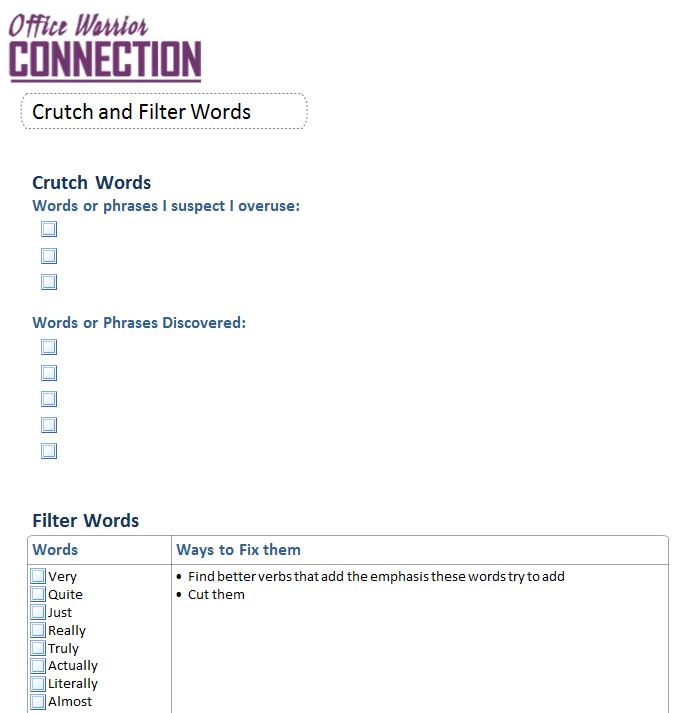|
5/28/2019 Day 28 - Crutch and Filter WordsThe Importance of Word Choice On Day 12, we talked about Chapter Pacing and made sure each chapter flowed into the next, but pacing is also affected by the length of words, sentences, and paragraphs. Longer or more difficult or unusual words and sentences force a reader to slow down. The brain shifts from reading to deciphering. Deciphering might be fine at the beginning of a story when we are world building and introducing characters, but we don't want to slow down readers who are cruising along imagining the big fight scene at the climactic ending of the story. Crutch words, due to their repetitive nature, and filter words, which are often extraneous, can also pull a reader out of the scene. Therefore, whenever possible, you may want to actively try to eliminate them. What are Crutch Words? Crutch words are those certain words, phrases, emotions, characteristics, etc. that we unwittingly overuse when we write. We all have our own personal Crutch words that we lean on (Get it? Lean on? Crutch words?) or tend toward using while we are writing. I find that when I'm doing sprints to get as many words on the page as I can in a short amount of time, my crutch words come out in droves. A good editor will spot those for you, but as you re-read your work, you may begin to spot them on your own. Two of mine are “giggle” and "sigh." I've also found that my characters roll their eyes a lot. In my current work in progress, my main character Elizabeth Aguera giggles a lot, but what is interesting about that is, if I had to describe my character, she would not be a character who giggles. She's a detective who lost a young daughter in an accident and who investigates murdered or missing girls during her annual vacation. She's a serious, thoughtful person. She doesn't giggle. Yet, when I search for the word "giggle" in my novel, Detective Aguera seems to always be on the inside of a joke. In works that I've edited for other authors, I've found, "for the first time ever” or “best ever” used multiple times throughout the stories. In fact, adverbs are often culprits when it comes to overused crutch words. Knowing this, you should keep an eye out for these words: basically, practically, almost, especially. What are Filter Words Filter words are similar to crutch words in that they are extraneous and often not needed to support the narrative of a story. They are often a sign of telling rather than showing (see Day 20 for more information about Showing vs Telling), and they prevent the reader from really experiencing the story from their personal point of view. Instead, they are viewing the story through the character's point of view. Adverbs may be filter words or crutch words, as are weak verbs and nouns that lack specificity or allow confusion when a sentence is read. Adverbs can be found by searching your manuscript for "ly." While not all adverbs end in -ly, it's a good way to eliminate a big share of them. Weak verbs include words like get or got and almost always have a stronger counterpart verb that can replace them. Nouns that lack specificity include stuff, thing, and that. These also usually have stronger words that can be used. In Day 27, we looked at Voice and Tense and discussed "-ing" words, but if you didn't get a chance to complete the exercise for that day, you should also search for "ing" to check and see if there are stronger options than the word being used. I've included it in the instructions below, just in case. Exercise 1: Find and Eliminate Your Personal Crutch Words and Phrases
Steps for using WordCounter.net
Exercise 2: Eliminate your Filter Words and Phrases
Crutch Words Checklist
More Resources See Anne Allen and Kathy Steinemann's post about filter words and phrases for even more detail about this topic, along with 80 alternative words and phrases that can help you unravel how to make the corrections. https://annerallen.com/2017/06/filter-words-and-phrases-to-avoid-in-writing/ Take a look at Diana Urban's post where you can find 43 words similar to the ones I have provided to catch even more filter words. https://dianaurban.com/words-you-should-cut-from-your-writing-immediately TIP for Microsoft Word users: Use Search and Replace with highlighting for all the filter words, then read back through your story again. You can use different colors of highlighting to mark different types of crutch words. See my Highlighter post for details. DOWNLOAD: Filter and Crutch Words Worksheet Template Instructions Return to the Table of Contents Go to Day 29 - Final Touches Comments are closed.
|


 RSS Feed
RSS Feed
